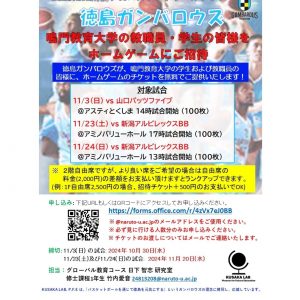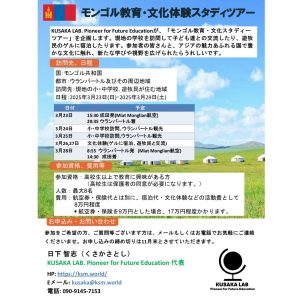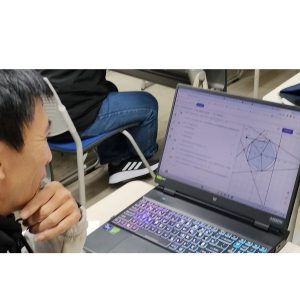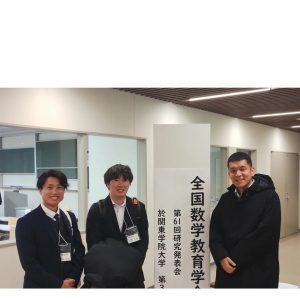LINKS of Research Achievements (研究業績リンク)
Research map: https://researchmap.jp/satoshi_kusaka
ResearchGate: https://www.researchgate.net/profile/Satoshi-Kusaka
University Website
日本語: https://www.naruto-u.ac.jp/edb/researcher/2021033100084/
English:https://www.naruto-u.ac.jp/edb/english/researcher/2021033100084/
Books (書籍)
Webb, J. (2025). Metacognition handbook: A practical guide to fostering children’s thinking at school and at home (S. Kusaka, H. Nishizawa, & N. Tanikawa, Trans.). Choeisha. ISBN 9784867821510
Hitomatsu, S., Okada, Y., & others (Eds.). (n.d.). Study with your friends, mathematics for elementary school (Grades 1–6; S. Kusaka, Chief Ed.). Gakko Tosho. (Certified by Ministry of Education, Culture, Sports, Science and Technology [MEXT], Japan)
Hitomatsu, S., Okada, Y., & others. (n.d.). Mathematics with everyone in elementary school (Grades 5–6; S. Kusaka, Co-author). Gakko Tosho. (Certified by Ministry of Education, Culture, Sports, Science and Technology [MEXT], Japan)
Baba, T., Nagisa, N., Fukuda, H., & Hattori, Y. (2022). Mathematics education in a glocal society and era (Chapter 3, pp. 47–56; S. Kusaka, Contributor). Academic Research Publication. ISBN 4910733655
Tarrant, P. (2022). Creating lessons to foster metacognitive skills: Specific methods based on practices in Scotland (S. Kusaka, Trans.). Choeisha. ISBN 4862659837
Mizoguchi, T. (2021). The new theory and practice of mathematics education (Chapter 11, Section 2, “Reassessing mathematics education from a glocal nature and perspective”; S. Kusaka, Contributor). Minerva Shobo. ISBN 9784623091072
Kusaka, S. (Ed.). (2019). National mathematics textbook (Papua New Guinea, Department of Education). Japan International Cooperation Agency, The Project for Improving the Quality of Mathematics, Science Education (UIS-ME Project). ISBN 9789980905093
Articles(論文)
2025
Hendriana, H., Ristiana, N., Kusaka, S., Peni, N. R. N., & Prahamana, R. C. I. (2025). Integrating indigenous number systems and indefinite units into mathematics learning: A study on Javanese language and culture. Infinity Journal, 14(3), 797-816. https://doi.org/10.22460/infinity.v14i3.p797-816
Kusaka, S., & Habimana, J. C. (2025). Metacognitive skills in collaborative problem solving: Case of secondary mathematics in Rwanda. The Journal of Educational Research, 118(2), 1–8. https://doi.org/10.1080/00220671.2025.2486473
Kaihata, K., & Kusaka, S. (2025). A study on the use of GeoGebra for developing spatial reasoning skills: Focusing on the perception of solid figures. NUE Journal of International Educational Cooperation, 18, 125–130. https://doi.org/10.24727/0002000762
Sawah, K. O., & Kusaka, S. (2025). The effect of metacognitive abilities on junior high school students in the Republic of Vanuatu when solving mathematical word problems. International Journal of Innovative Research and Scientific Studies, 8(1), 2235–2247. https://doi.org/10.53894/ijirss.v8i1.4935
2024
Kusaka, S. (2024). The philosophy of endogenous curriculum development: Insights for integrating global trends and local evidence. Mongolian Journal of Educational Research, Special Issue, 54–61. https://doi.org/10.56380/mjer.si.2024.07
Zaenuri, Widiyatmoko, A., Kusaka, S., Susilayati, M., & Subhan. (2024). Fostering sustainability and resiliency skills through STEM education technology: A scoping review. Pakistan Journal of Life and Social Sciences, 22(2), 18224–18247. https://doi.org/10.57239/PJLSS-2024-22.2.001331
Prahmana, R. C. I., Kusaka, S., Nofikusumawati, N. R., Endo, H., Azhari, A., & Tanikawa, K. (2024). Cross-cultural insights on computational thinking in geometry: Indonesian and Japanese students’ perspectives. Journal on Mathematics Education, 15(2), 613–638. https://doi.org/10.22342/jme.v15i2.pp613-638
Simbine, C. A., Kusaka, S., & Ishizaka, H. (2024). Analysis of teachers’ understanding of representations for addition with carrying and subtraction with borrowing. NUE Journal of International Educational Cooperation, 17, 35–41.
Tanikawa, K., Hamaguchi, M., Kawagoe, M., & Kusaka, S. (2024). A comparison of anxiety of junior high school students when learning English: Focusing on the special English education curriculum at Kochi Municipal Compulsory Education School, Tosayamagakusya. NUE Journal of International Educational Cooperation, 17, 29–34.
2023
Ikeda, A., Kusaka, S., & Baba, T. (2023). Reconsidering a case of Strengthening of Mathematics and Science in Secondary Education (SMASSE) projects in Kenya from the perspective of endogenous development. Africa Educational Research Journal, 14, 53–65. https://doi.org/10.50919/africaeducation.14.0_53
Rizki, L. M., Kusumah, Y. S., Nurlaelah, E., & Kusaka, S. (2023). Students’ mathematical literacy based on visual learning style at junior high school. Jurnal Akademik Pendidikan Matematika, 9(2), 119–128. https://doi.org/10.55340/japm.v9i2.1579
Sawah, K. O., & Kusaka, S. (2023). Analysing teachers’ perception of the try-understand-apply-mastered discovery learning processes in Vanuatu using the constructivist grounded theory approach. International Journal of Educational Methodology, 9(1), 123–138. https://doi.org/10.12973/ijem.9.1.123
Nhantumbo, A. A., Ishizaka, H., & Kusaka, S. (2023). Review of competencies in primary education curriculum in Mozambique: How an assessment is supposed to be done on it in mathematics? NUE Journal of International Educational Cooperation, 16, 11–19.
2022
Kusaka, S., & Ndihokubwayo, K. (2022). Metacognitive strategies in solving mathematical word problems: A case of Rwandan primary school learners. SN Social Sciences, 2, Article 186. https://doi.org/10.1007/s43545-022-00495-5
Kusaka, S. (2022). Challenges and opportunities of local curriculum in Mozambique’s elementary mathematics: Analysis of interview data with curriculum coordinators and teachers using M-GTA. Journal of International Development Studies, 31(1), 131–140.
Kusaka, S. (2022). Exploring the endogenous development of mathematics curriculum in the African context from the perspective of educational borrowing theory. NUE Journal of International Educational Cooperation, 15, 13–24. https://doi.org/10.24727/00029308
Kusaka, S. (2022). Transition of Mozambique’s primary mathematics intended curriculum in the post-colonial period: A focus on adaptation from an exogenous curriculum. Africa Education Review, 18(3–4), 25–40. https://doi.org/10.1080/18146627.2022.2150242
2021
Kusaka, S. (2021). Systematizing ICT education curriculum for developing computational thinking: Case studies of curricula in the United States, Australia, and the United Kingdom. Journal of Education and Learning, 10(5), 76–76. https://doi.org/10.5539/jel.v10n5p76
Kusaka, S. (2021). Analysis of learning difficulties with fractions in three African countries: Focusing on the scope, sequence and models of fractions. African Journal of Education and Practice, 7(2), 77–91.
https://doi.org/10.47604/ajep.1267
2020
Kusaka, S. (2020). The role of curriculum studies in the spread of competency-based educational reforms in African countries. Africa Educational Research Journal, 11, 26–35. https://doi.org/10.50919/africaeducation.11.0_26
Kusaka, S. (2020). Comparative analysis of fraction learning and sequencing in the intended mathematics curricula of three Eastern and Southern African countries: Fundamental research on mathematics curricula in African nations for the achievement of SDGs Goal 4. Journal of African Studies, 98, 11–19. https://doi.org/10.11619/africa.2020.98_11
Kusaka, S., Nhêze, I. C., & Baba, T. (2020). Analysis of the intended mathematics curriculum revision process in Mozambique from the perspective of relevance. Journal of Curriculum Studies, 53(5), 642–658. https://doi.org/10.1080/00220272.2020.1855256
Kusaka, S. (2020). Revising Mozambique’s primary mathematics curriculum from the perspective of educational borrowing theories focusing on intrinsic development of education. Journal of International Educational Cooperation, 29(2), 89–104.
Nakawa, N., Kusaka, S., Kosaka, M., Watanabe, K., & Baba, T. (2020). Primary school children’s counting and number composition processes from two pilot studies in schools in Zambia. African Journal of Research in Mathematics, Science and Technology Education, 24(3), 361–374. https://doi.org/10.1080/18117295.2020.1851889
Kusaka, S. (2020). Analysis of Mozambican elementary mathematics textbooks compared with Japanese focusing on tasks and exercises related to the real world. Global Journal of Educational Studies, 6(1), 1–1.
Kusaka, S. (2020). Comparative analysis of the primary mathematics intended curriculum between Mozambique and Portugal: Current situation of the transplanted curriculum. International Journal of Curriculum Development and Practice, 22(1), 1–13. https://doi.org/10.18993/jcrdaen.22.1_1
2019
Kusaka, S. (2019). Issue analysis of competency-based mathematics curriculum design in African countries: A case study of Mozambique’s primary mathematics education. Journal of Education and Learning, 9(1), 41–41. https://doi.org/10.5539/jel.v9n1p41
Baba, T., Nakawa, N., Nkhata, B., Arthur, M., Banda, B., Emmanuel, K., Kosaka, M., Kusaka, S., Mambwe, B., & Nkhalamo, C. J. (2019). The development of an assessment instrument for numeracy competence and its application to selected primary schools in Zambia. Zambia Journal of Teacher Professional Growth, 5(2), 72–79.
Kusaka, S. (2018). Proposal for an analytical framework of the intended mathematics curricula from a social-cultural perspective: Examination of validity in the foundation structure with reference to Mozambique. JASME Research in Mathematics Education, 24(2), 67–76. DOI not available.





